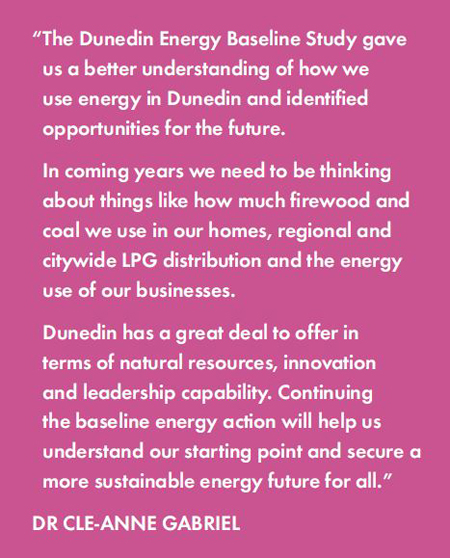
Current position
 The actions proposed in this plan need the support of the city’s businesses, community groups and research community. The Energy Leaders enabling action is designed to encourage and facilitate this support. But how will the success of these actions be measured? How will monitoring, evaluation
and feedback take place?
The actions proposed in this plan need the support of the city’s businesses, community groups and research community. The Energy Leaders enabling action is designed to encourage and facilitate this support. But how will the success of these actions be measured? How will monitoring, evaluation
and feedback take place?
In September 2015 the Dunedin Energy Baseline Study was published. It was the first time our city had the opportunity to take a good look at current energy use and where we get our energy from. The baseline provided a framework for encouraging research that will enable us to monitor our energy inputs in years to come.
This Baseline Energy action is an information action. It recognises and formalises the need to continue to monitor, evaluate and report.
Action and delivery
The 2015 Energy Baseline brought together and used knowledge held by many city stakeholders. The intention is for stakeholders to continue gathering and sharing relevant energy data annually to inform and assist with the implementation of the Energy Plan 1.0’s actions. The Night Sky City action aims to reduce the cost of the city’s public lighting while improving its overall energy efficiency. The city’s main electricity stakeholders have already shown interest in Energy Leaders and a commitment to helping achieve these goals. The Baseline Energy action establishes collaboration with these stakeholders to monitor the city’s electricity use and consumption. It will also work with these stakeholders to improve the detail and relevance of the energy information that is reported to the public.
Likewise, the Cosy Homes action will encourage work already underway to help Dunedin’s homes become warm and cosy by 2025. The Baseline Energy action will monitor changes in heating fuel use.
The Dunedin EV action focuses on facilitating the use of electric vehicles in the city. It also lends support to other alternative and communal forms of transport, such as those outlined in the city’s Integrated Transport Strategy. The Baseline Energy action will monitor the impacts of these activities by keeping track of the city’s imports of conventional fuels.
Further community energy initiatives (see Energy Fast-Track action) will develop from, and be influenced by, monitoring Dunedin’s energy use and inputs. Problem areas may be identified. Improvements and achievements can be highlighted and celebrated. Ideas emerging from Dunedin’s communities can receive the support and advocacy they deserve.
Measuring success
Successful delivery of this action will result in:
- Dunedin’s energy data being published annually, into the foreseeable future
- better understanding of Dunedin’s energy inputs and uses over time
- consistent media interest and coverage of the study’s findings.
Key delivery partners
- The Dunedin Energy Baseline Study (2015) was completed with the support of:
- Centre for Sustainability, University of Otago
- Otago Chamber of Commerce
- Dunedin City Council
- Dunedin City Council
- Energy Leaders Accord partners
| Confirmed activities | ||
| Delivery activities | Lead organisations | Measuring progress |
|---|---|---|
| Establish Baseline Energy as a part of Dunedin’s ongoing energy activities and commitments |
|
|
| Identify and/or appoint a lead for future monitoring and reporting of the city’s energy inputs |
|
|
| Identify key holders of energy data and information important to the community |
|
|
| Formalise commitments by energy leaders to provide, share and publish data |
|
|
| Collect and share data on Dunedin’s energy situation annually |
|
|
| Engage energy leaders in taking identified actions forward |
|
|
Photo by Stefan Mutch
